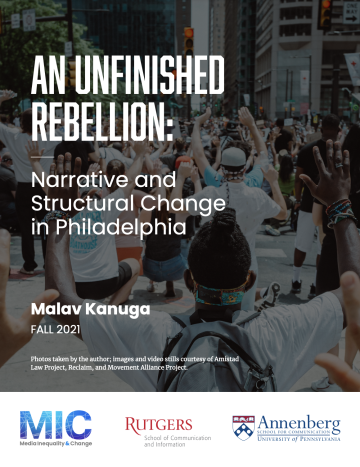
Philadelphia’s Media Ecosystem
With increasing public attention focused on threats to the integrity of our news and communication systems, it is vital that we take stock of Philadelphia’s media ecosystem, assess its strengths and weaknesses, and imagine how we can reinvent journalism for a stronger democracy.
To this end, the Media, Inequality and Change (MIC) Center — a joint project of the Annenberg School for Communication at the University of Pennsylvania and the School of Communication and Information at Rutgers University — along with Media Mobilizing Project and Free Press, have received a $2.6 million collaborative grant from Independence Public Media.
There are many practices and structures that shape a media ecosystem: decisions about what is newsworthy, how reporters build and prioritize relationships with community organizations, how stories are told and by whom, the ownership and control of newsrooms, and the metrics outlets use to determine a story’s value, just to name a few.
With local newsroom numbers decimated and the systemic failure of traditional advertising models on full display, MIC hopes to identify new models for media that enables communities to be engaged in shaping and lifting up narratives that better represent them and address important social problems.
The three-year collaborative project with Media Mobilizing Project and Free Press aims to address these issues by understanding how social change happens, the media’s role in creating obstacles and opportunities for structural reform, and what innovative, community-centered media and media-making can and should look like in the Philadelphia region.
MIC will lead two integrated research projects focused on Philadelphia’s local media ecosystem. Mapping media institutions will be a multi-year, multi-phase study employing mixed methods and resulting in an in-depth, structural analysis of the region’s news media. MIC’s community network analysis will employ a political economic framework that assesses the ownership and control of local media as well as how communities harness media to make positive social change. Drawing on our deep national and international networks, MIC will cross-fertilize best practices, amplify findings, and facilitate dialogue across the city and beyond. As part of this project, MIC also will provide regular opportunities for project partners and community organizations to meet, share data, and collaborate with researchers, practitioners, and organizations engaged in similar work in other locations domestically and internationally. The project as a whole will contribute to new knowledge about the interrelationships between media, organizing, and social change. It will also shed light on the ways in which our local media ecosystem upholds systems of power. Ultimately, our aim is to outline a vision for remaking media in ways that reflect communities’ information needs, especially around vitally important social issues such as public health, crime, and inequality.
Photo Credit (top image): iStock / Rawpixel
Publications
Journal of Communication, 2022
Authors: Timothy Neff, Pawel Popiel, Victor Pickard
Read "Philadelphia’s News Media System: Which Audiences Are Underserved?"
Benton Institute for Broadband & Society, 2022
Authors: Pawel Popiel, Victor Pickard
International Journal of Communication, 2022
Authors: Pawel Popiel, Victor Pickard
Read "Digital Redlining and the Endless Divide: Philadelphia’s COVID-19 Digital Inclusion Efforts"
International Journal of Press/Politics, 2021
Authors: Timothy Neff, Victor Pickard
2021
Author: Malav Kanuga

The report, by Post-Doctoral Researcher Malav Kanuga, analyzes recent trends in community organizing and mobilization in Philadelphia and finds three distinct but overlapping strategies among organizations responding to the interconnected crises of urban violence, policing, criminal justice and issues of housing, education, and work. The strategies include community organizing around policy reform, popular mobilizations around electoral strategy to shift governance, and mass street-based protests most exemplified by the uprising of 2020 which expresses a deeper rupture with current governance structures and the ongoing management of crises through reforms.
Read "An Unfinished Rebellion: Narrative and Structural Change in Philadelphia"
Journalism Studies (Under Revision)
Authors: Timothy Neff, Victor Pickard
